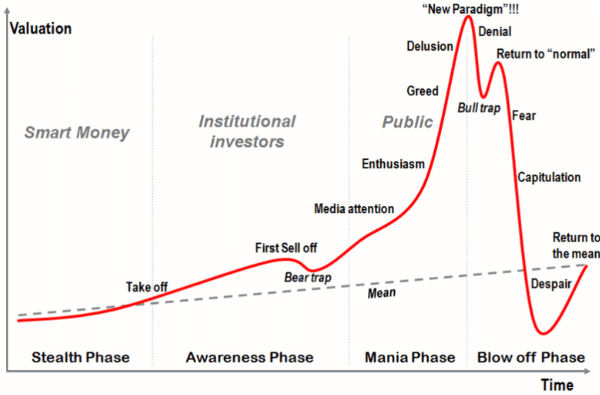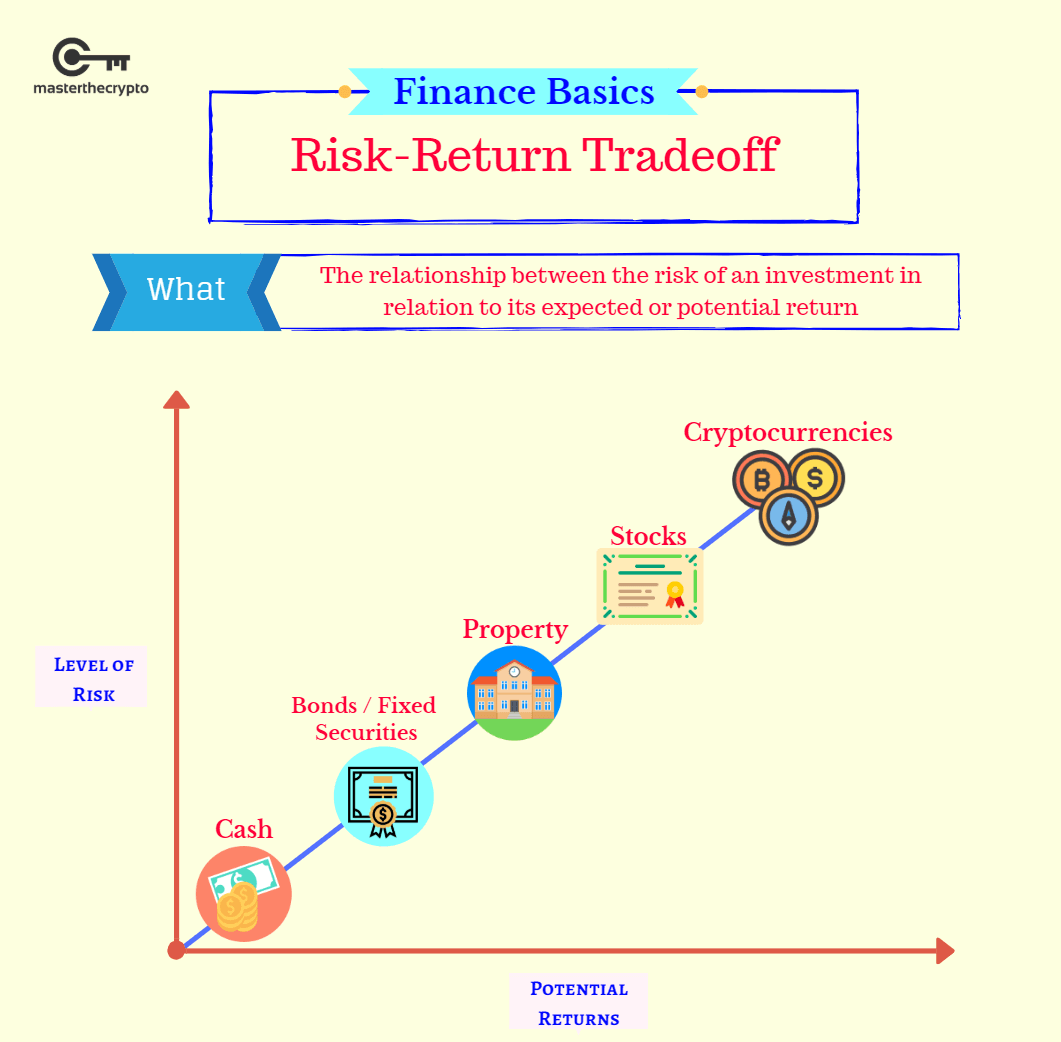This article highlights 4 lessons the cryptocurrency market taught us about investing and educates us on how we should evaluate the market moving forward.
Most initial coin offerings (ICO’s) that have launched over the past 2 years have completely, and utterly failed. Yes, I’ve written about why this doesn’t matter – and it may still not really matter. We’ll get more into that in a moment.
But a lot of people – including myself – have lost money in the market. It’s worthwhile to take a look at the past 2 years and see what the cryptocurrency market has taught us about investing.

Here are 5 lessons that every cryptocurrency investor can take into the future.
(See also: Cryptocurrency Investing vs Trading: What’s the difference?)
Lesson 1: Understand What is A Cryptocurrency
This seems like a basic point. Naturally, it seems that most of us understand the basic concept of cryptocurrency. However, it is worthwhile to dive into this a bit further.
The industry is changing so rapidly, that unless you’re trading on a daily basis or working in the industry, it is easy to overlook the fundamentals of what makes up a cryptocurrency.
As an enabler that facilitates disruption across many different industries and use cases, there are numerous nuances that an individual must understand before diving into the market. The market is filled with various complex technical terminologies and concepts that are confusing to the average Joe.
As any seasoned investor in the traditional markets – bonds, commodities, foreign exchange or otherwise – will tell you, familiarity and comprehension of the market they're in is a key factor to success.

The cryptocurrency market is no different. Re-visiting basic concepts in a market filled with extreme sentiment and volatility can truly help you in strengthening your market edge and managing your risks.
That is why we have consolidated a list of helpful resources that aims to simply explain various concepts and terms in the cryptocurrency market here:
Cryptocurrency Guides: Comprehensive List of Crypto Guides For Beginners
(Read also: Top 10 Crypto/Blockchain Infographics You Must Know)
Lesson 2: Look Beyond the PR and Marketing Hype
We are all human. And as such, there is a certain predictable tendency that we all conform towards. Analyzing the cryptocurrency market in 2017 and 2018, there is a visible pattern of market predictability during the bull run in 2017 and the consequent market crash in early 2018.

As Dan Ariely of Predictably Irrational shares in his book, as an individual, we may be unpredictable. However, as a segment of a larger population or group (programmers, tech enthusiasts, cryptocurrency traders, etc.) we are very predictable.
One of our predictable behaviors is being vulnerable to the storytelling hype that connects to our inner core drives. It could be the fear of missing on a huge opportunity, the need to feel liked, the desire to impress one's peer group or simply the drive to a higher calling.
It is these psychological traits that have driven marketing and public relation (PR) practices for decades. You only have to look back at the father of PR – Edward Bernays – to realize that immense psychological power that went into developing PR. Edward leveraged the insight of his uncle at the time – none other than Sigmund Freud, a psychologist who is widely regarded as one of the 100 most important people of the 20th century
These psychological concepts are at the base of what attracts us in the cryptocurrency investment arena. Practices such as massive pre-sale discounts, fluffy claims by projects and paid reviews are a common sight in this largely unregulated industry. The media adds to the flames, sparking our curiosity, concern, and excitement. Unraveling these layers of fluff and hype is a valuable skill that one must acquire in order to differentiate between a fundamentally good project or a bluff.
Here a few questions to consider:
- Are the underlying fundamentals of what this company says possible?
- Are the underlying fundamentals of this team sound? Are they a good team?
- What about this company is verified VS non-verified?
- Is the market signaling hype?
- Does it seem too good to be true?
Here is a helpful list that would assist you in evaluating the fundamentals of a project:
A Guide To Fundamental Analysis For Cryptocurrencies
(See also: Will A Crash in Bitcoin’s Price Lead to Its Demise?)
Lesson 3: You’ll Lose 9 of 10 “Alt Bats”
The number may actually be more. Investing – from my limited experience – in early-stage tech startups is a risky game. Cryptocurrencies are a highly risky asset class due to its infancy and speculative attraction.
Investing in a cryptocurrency project entails ‘taking a bet' on the success of the venture, by assessing various factors that include the strength of the team, the viability of the project, achievability of the roadmap, utility of the tokens and many more. If successful, we would revel in the returns of our investment.
And while the cryptocurrency market is designed to look (and feel) like a stock market, it’s really nothing more than an early stage, unregulated angel investment market (minus the part where you get to own a piece of the company). Therefore, taking regular startup vernacular into play, looking at the failure rate of most startups will tell you that 9 of 10 startups fail in the first 5 years of operation.
We’re 2-years in this volatile market and have already seen 60%+ of previous ICO’s get completely wiped out. The valuation of all coins has taken a huge hit, with prices falling by an average of more than 85% since their all-time highs. It must also be mentioned that scams and Ponzi schemes in the industry are a common occurrence.
(Read more: Coins, Tokens & Altcoins: What’s the Difference?)
Lesson 4: DYOR – Due Diligence
Investing is hard. No one is going to do it for you. No one is going to give you all the right insights. No one has the crystal ball of clarity on where the market is going. You need to take time to do the research yourself. The burden is on you to dig into a project and truly understand what you’re getting into.
It takes time. If we’ve learned anything from the Bitconnect, Bitcoin, and recent QuadrigaCX scandals it’s that every investor must do their own deep due diligence. This requires going further than a website. Further than a white-paper. Further than a LinkedIn check.
As someone who’s had their profile stolen and used for both a white paper and a website, I can assure you that there are companies out there looking to leverage influencers, high-net-worth individuals, credible technology leaders and the like – for scam purposes. If you’re not taking the time to dive into the details of a white-paper, the technical capabilities of the project, the investors and advisors listed – you stand a good chance to lose your money.
We only have to look back at the billions lost over the last couple of years.
(See also: Evolution of Cryptocurrency: Replacing Modern Cash)
Summing it All Up
The landscape is changing. Regulation is coming. And yes, there will be more trends – securitized token offerings (STOs) may just one of the more recent ones.
Until then, here is the summary of the 4 core lessons that every investor in an early-stage, blockchain company can leverage on:
- Truly understand what cryptocurrency is all about – and dive into the nitty-gritty of each potential investment.
- Look beyond PR & Market hype
- 9 of 10 early stage startups will fail. Be prepared for this and invest accordingly.
- Do your own deep due diligence
Here’s to 2019 investing in great companies in 2019 and beyond.
Cahill Puil is an author, founder and CEO of Byte Media Group. He has interviewed many of the Top 100 Blockchain CEO's, Founders and influencers. His insights have been featured in dozens of publications – from Hackernoon, Brave New Coin, and Cryptocurrency News to Fintech Weekly, Tabb Forum, and CEO World. His team is currently focused on helping the leading blockchain and technology companies build credibility, exposure, and share stories with innovative thought-leadership and PR.
Beneficial Resources To Get You Started
If you're starting your journey into the complex world of cryptocurrencies, here's a list of useful resources and guides that will get you on your way:

Trading & Exchange
- Crypto Guide 101: Choosing The Best Cryptocurrency Exchange
- Guide to Bittrex Exchange: How to Trade on Bittrex
- Guide to Binance Exchange: How to Open Binance Account and What You Should Know
- Guide to Etherdelta Exchange: How to Trade on Etherdelta
- Guide To Cryptocurrency Trading Basics: Introduction to Crypto Technical Analysis
- Cryptocurrency Trading: Understanding Cryptocurrency Trading Pairs & How it Works
- Crypto Trading Guide: 4 Common Pitfalls Every Crypto Trader Will Experience
Wallets
- Guide to Cryptocurrency Wallets: Why Do You Need Wallets?
- Guide to Cryptocurrency Wallets: Opening a Bitcoin Wallet
- Guide to Cryptocurrency Wallets: Opening a MyEtherWallet (MEW)
Read also: Crypto Trading Guide: 4 Common Pitfalls Every Crypto Trader Will Experience and Guide To Cryptocurrency Trading Basics: Introduction to Crypto Technical Analysis.
You can also join our Facebook group at Master The Crypto: Advanced Cryptocurrency Knowledge to ask any questions regarding cryptocurrencies.

